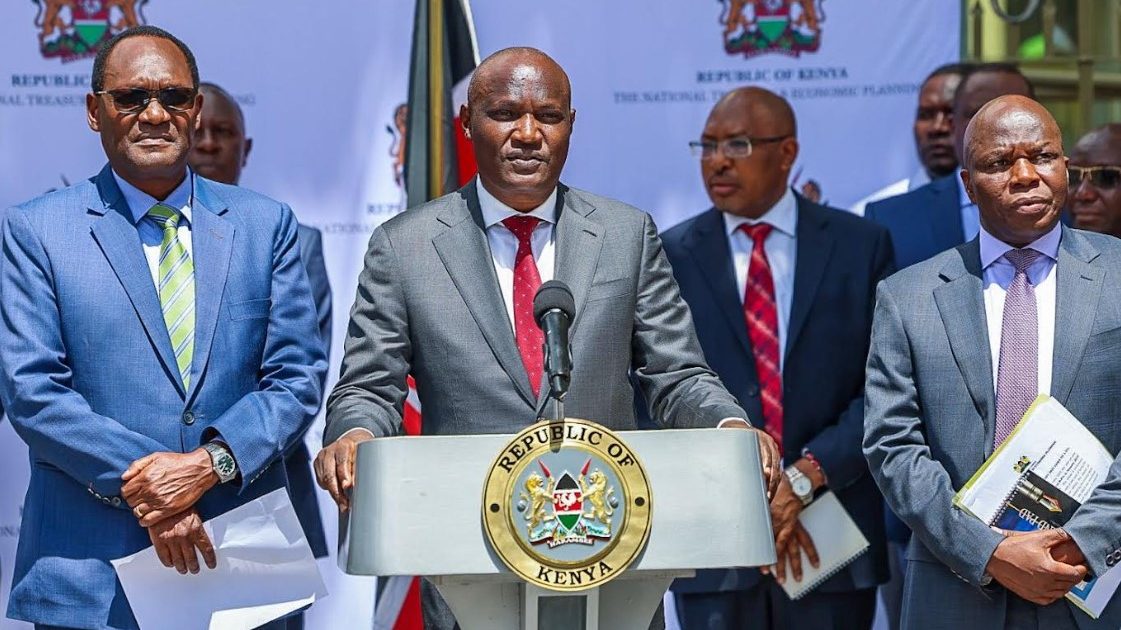National Treasury and Economic Planning Cabinet Secretary John Mbadi has affirmed that Kenya’s economy has demonstrated remarkable resilience despite facing both domestic and external shocks, a performance attributed to sound and deliberate government policies and the country’s diversified economic structure.
Speaking during a press briefing at the National Treasury Buildings, the CS noted the reduction of the gross public debt to Gross Domestic Product (GDP) ratio from 71.9 per cent in June 2022 to 66.7 per cent in June 2024 has been achieved through a combination of tax policy adjustments, spending cuts, and stimulating economic activity in various sectors.
“The Present Value of the debt to GDP ratio dropped from 68.7 per cent in 2023 to 63.0 per cent in 2024, thanks to exchange rate appreciation and fiscal consolidation efforts,” said the CS.
Mbadi noted that macroeconomic indicators continue to highlight the economy’s resilience, especially in the external sector and foreign exchange stability.
Mbadi added that the Central Bank of Kenya (CBK) has eased monetary policy in response to inflation trends.
“The Central Bank Rate (CBR) was reduced from 13 per cent in August 2024 to 11.25 per cent in December 2024 and further to 10.75 per cent in February 2025,” he stated, adding that the Cash Reserve Ratio (CRR) was lowered by 100 basis points to 3.25 per cent in February 2025 to boost credit growth in the private sector.
Additionally, he reiterated that interest rates have declined in alignment with monetary policy easing, making the interbank rate drop from 13.7 per cent in January 2024 to 11.2 per cent by January 2025, remaining within the prescribed range around the CBR.
“Treasury Bill rates also declined significantly, with the 91-day rate falling to 9.11 per cent in February 2025 from 16.1 per cent a year prior, the 182-day rate decreasing to 9.85 per cent from 16.2 per cent, and the 364-day rate dropping below 11 per cent from 16.4 per cent,” said the CS.
CS Mbadi emphasized that the easing of monetary policy has resulted in a recovery in private-sector credit with commercial banks lowering interest rates.
“Several major banks have already reduced their base lending rates, including Cooperative Bank from 16.5 per cent to 14.5 per cent, KCB from 15.6 per cent to 14.6 per cent and Equity Bank from 17.3 per cent to 14.3 per cent, with others such as ABSA and NCBA expected to follow,” he stated.
The CS acknowledged that inflation has also significantly declined due to government interventions in food and energy prices dropping from 9.6 per cent in October 2022 to 3.3 per cent in January 2025, in addition to tax law amendments introduced at the end of 2024, which have eased the financial burden on Kenyan households to ensure economic liquidity benefits all citizens.
“Addressing the persistent issue of pending bills remains a priority, as delayed payments have adversely affected businesses, particularly Micro, Small, and Medium Enterprises (MSMEs), and impacted public confidence in government financial management,” he noted, assuring that the government remains steadfast in its commitment to ensuring that economic gains translate into tangible benefits for all Kenyans.
“The administration acknowledges the financial realities citizens face and continues to implement policies aimed at fostering economic stability and prosperity, the CS affirmed.
In a quick rejoinder, Principal Secretary of State Department (PS) for National Treasury Dr. Chris Kiptoo reiterated that the diversified economy and resilience have enabled the GDP to remain one of the highest in the world because the world growth rate is around three per cent with sub-Saharan Africa representing 3.7 per cent and our GDP is around 5 per cent.
“So assuming we don’t have any other shocks coming soon, we think that we will continue doing well and we seek the support of Kenyans in the journey towards ensuring that we have a stable economy that provides for jobs and the rest,” said Dr. Kiptoo.
The Principal Secretary (PS), the State Department for Economic Planning James Muhati, highlighted that the economy is committed to ensuring the plans are seamless and properly aligned with the budget and available revenue as well.
“As you are aware, we are also mandated with the responsibility of focusing on the quality of data, which informs most of the policy decisions through the Kenyan National Bureau of Statistics (KNBS),” stated Muhati, noting that the inflation rates have also decreased significantly.
By Joan Ogolla




